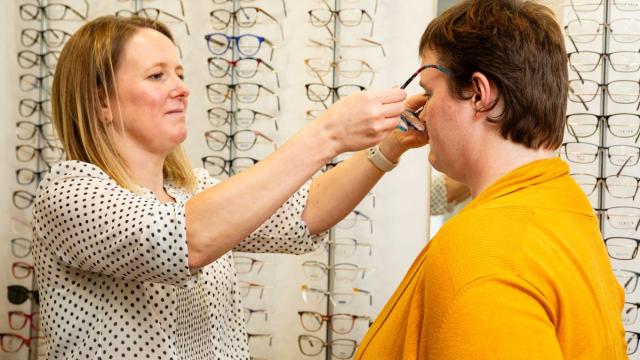Wearing glasses adults (easy read)
Easy read fact sheet on wearing glasses for adults.

Everybody’s sight without glasses gets worse as they get older.

Most people need to wear glasses at some time in their life.

The person who tests your eyes is called an optometrist.
We will call them an optician in this factsheet.

You should have an eye test at the optician's every year.

You might need glasses to see things close to you:
Using your phone.

Eating.

Using a computer.

You might need glasses to see things further away:
Watching TV.

Watching a show or film.

Going out.

You can go to any optician to choose your glasses.
You need to take your prescription with you.

Your optician will tell you why you need glasses.
They will give you a prescription which tells you and others about the glasses you need.

We have a form called – ‘Feedback from my optometrist’.
You can ask the optician to fill this form in. It will explain why you need glasses.

You may need 2 pairs of glasses.
One pair for seeing things close to you.
One pair for seeing things further away.

Some people need glasses with special lenses.
Bifocals or varifocals are glasses that have special lenses.
The lenses will help you see further away and close to you.

You can get glasses that help you see clearly that are also sunglasses.

Some glasses have lenses that go dark when the sun is out.

There are lots of frames that are very strong or very thin or flexible.
These frames might fit your face better.
The optician will help you choose the right glasses.

It is important to wear your glasses.
Tell people who support you about your eyesight.

They need to know what you wear glasses for.
Write why you wear glasses in your health action plan or support plan.

It can take time to get used to your glasses.
You may need to practice wearing them.
People may need to support you to wear them until you are used to them.

Keep your glasses clean.
You can clean your glasses gently with the cloth in your glasses case.
Your supporter can help you keep your glasses clean.

Wash them carefully in warm, soapy water.
Then dry them with a glasses cloth.

If you want, you can have a strap for your glasses.
Some people have a strap on their glasses.
This stops their glasses falling off, getting lost or damaged.

Use your glasses case.
When you take your glasses off keep them safe in your glasses case so they don’t get scratched or broken.

Have your name on your glasses.
You can ask you optician if you can have your name put on the glasses frame.

Tell your optician if your glasses don’t fit, are broken or uncomfortable.

Your glasses can become loose, slip down your nose, or even fall off your face.

You can take your glasses to an optician if they are uncomfortable or if you need to get them fixed.
They often do small repairs for free.

Your eyesight can change.
If you find it harder to see well with your glasses your eyesight may have changed.

It is important to book a new eye test.
It might be time to get new glasses.

You could have different colour glasses.

You could have different colour glasses cases.

You could use stickers on the case to show what activities they are for.


